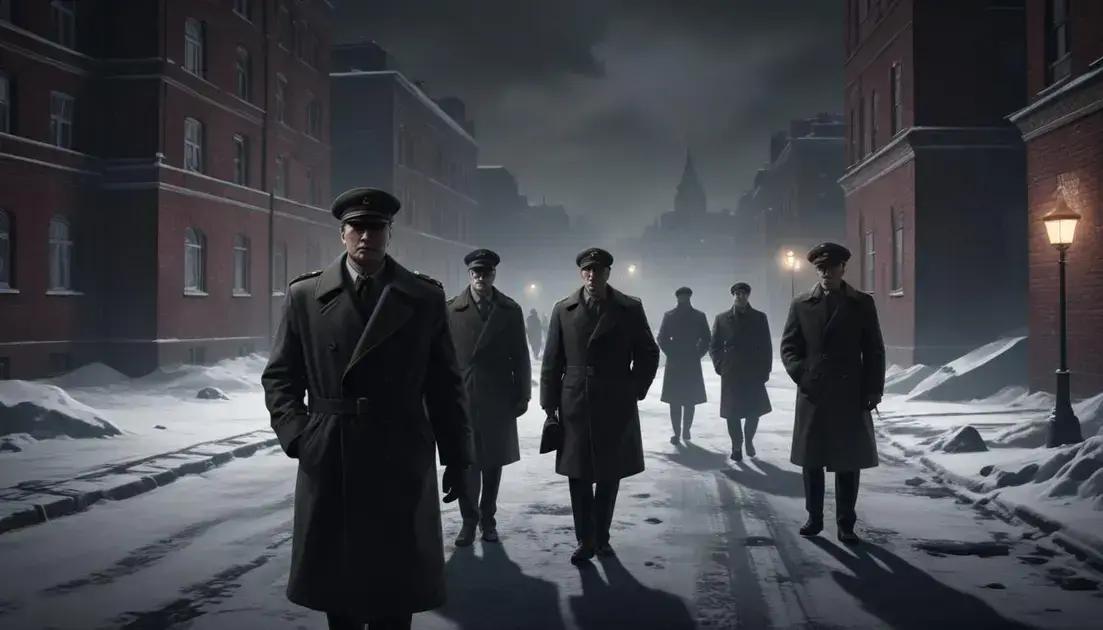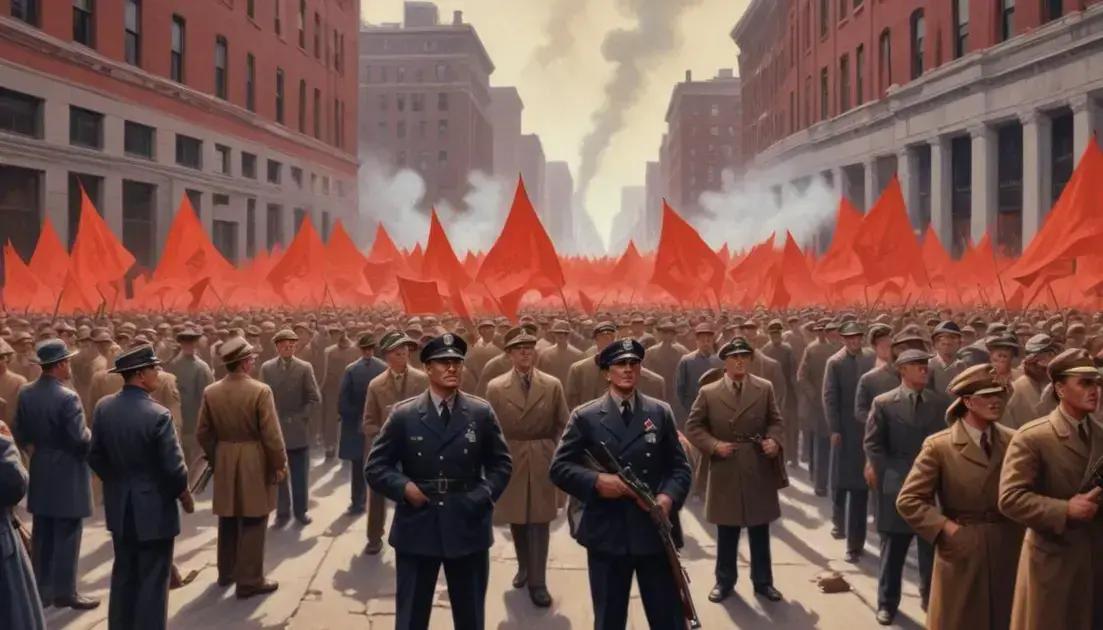
KGB: The Secrets of Soviet Espionage
The KGB, a prominent Soviet intelligence agency, significantly influenced global politics through its espionage tactics and covert operations. Established in the early 20th century, it played crucial roles during the Cold War by gathering intelligence, supporting communist movements, and impacting diplomatic relations. Notable operations, such as infiltration and surveillance, allowed the KGB to manipulate events and maintain Soviet control in various regions. Its legacy continues to shape modern intelligence practices and international affairs.
In the shadowy world of espionage, KGB stands out as one of the most impactful intelligence agencies. This article delves into the intricacies of Soviet espionage and its lasting influence on global politics.
The Origins of KGB
The origins of KGB date back to the early days of the Soviet Union. It was created in December 1917, right after the Bolshevik Revolution. Initially, it was called the All-Russian Extraordinary Commission for Combating Counter-Revolution and Sabotage, or Cheka for short.
In those times, the Cheka focused on rooting out enemies of the state. They used a mix of intimidation and espionage to control dissent. This helped consolidate the Bolshevik power during a turbulent period.
As the years went by, the organization evolved. It was renamed multiple times, becoming the GPU, then the OGPU, and eventually the NKVD in the 1930s. Each change reflected the shifting needs of the Soviet regime.
Under Stalin, the NKVD expanded its role and influence. It wasn’t just an intelligence agency anymore. It became a tool for political repression. Many people were arrested, interrogated, or even executed under its watch.
In 1954, the KGB as we know it was officially formed. It combined various intelligence and police functions. This made it one of the most powerful organizations in the Soviet Union. Its primary duties included foreign intelligence, counterintelligence, and internal security.
Inside the World of Espionage
Inside the world of espionage, secrets lurk at every corner. It’s a game of wits, lies, and clever tactics. Agents work to gather information while staying invisible. They use disguises, false identities, and even friends to achieve their goals.
Espionage isn’t just about stealing documents. It’s also about understanding how other nations think and act. Agents often study different cultures to blend in and build trust. This helps them gather valuable insights.
Technology plays a big role in modern espionage. From advanced satellites to hacking, tools have changed. Today, information can be collected without ever walking into a building. Digital spies can analyze vast amounts of data from anywhere in the world.
But it’s not all high-tech gadgets. Old-school methods still matter. Handwritten notes, secret meetings, and listening devices are still in use. These classic techniques often prove effective regardless of technology.
However, being an agent isn’t easy. They face constant dangers. They might be caught, or worse, in foreign lands. This brave work often requires high levels of training and skill. Many agents go through intense courses to prepare for the field.
The world of espionage is filled with its own code of ethics. Agents must decide what lines they won’t cross. Loyalty to their country and cause often guides their decisions.
Infiltration Tactics
Infiltration tactics are crucial in the world of espionage. These techniques allow agents to blend in and gather information. One common method is using false identities. Agents create fake personas to gain trust and access.
Another tactic is called surveillance. This means observing people or places without being noticed. By doing this, agents collect valuable data. They might watch how a target operates or interacts with others.
A good agent knows how to manipulate situations. They might create a distraction to slip into a secure area. This requires quick thinking and adaptability. Agents often train for months to master these skills.
There are also tech-savvy methods. Using hidden cameras or listening devices helps gather information discreetly. These tools can capture conversations or activities without the subject knowing.
Networking is also important. Agents build relationships with insiders. They might offer something of value to gain access. This can be information or even financial incentives.
In some cases, agents use social engineering. This tactic tricks people into giving information unknowingly. A simple call or email can lead to valuable data if the target isn’t careful.
Notable Operations
Notable operations by the KGB showcase its power and cunning in Cold War espionage. One famous operation was called Operation Trust. This was a trick to mislead anti-Bolshevik forces in the 1920s. The KGB pretended to support these groups while secretly undermining them.
Another significant operation was Operation Gold in the 1950s. The KGB dug tunnels under West Berlin to tap into Western communications. This allowed them to eavesdrop on key discussions and strategies.
During the Cuban Missile Crisis, the KGB played a crucial role. They gathered intelligence on U.S. military movements and shared that info with Soviet leaders. This helped shape the Soviet response during that tense period.
In the late 1970s, the KGB targeted the United States and its allies. They ran operations to steal military secrets and technology. This included tracking aerospace advancements and scientific research.
One of the most daring operations was the theft of the American U-2 spy plane technology. The KGB managed to capture valuable materials that helped them improve their own aviation capabilities. This was a major win for Soviet intelligence.
These operations highlight the KGB’s ability to adapt and succeed in challenging environments. They used a mix of deception, technology, and resourcefulness to achieve their goals.
Impact on Global Politics
The impact on global politics by the KGB has been significant and far-reaching. Throughout the Cold War, the KGB used its intelligence to shape international relations. They gathered key information that influenced decisions made by world leaders.
One major effect was in Europe. The KGB helped maintain the influence of the Soviet Union over Eastern Europe. They supported communist parties and movements to ensure control and stability.
During crises, the KGB’s actions often affected diplomatic ties. For example, their involvement in the Cuban Missile Crisis heightened tensions between the U.S. and the Soviet Union. This event brought the world to the brink of nuclear war.
In Africa and Asia, the KGB backed liberation movements. They provided training, funds, and political support. This led to the establishment of friendly regimes that aligned with Soviet interests.
The KGB also played a role in espionage against Western nations. They aimed to gather secrets that could shift the balance of power. The intelligence collected often shaped military strategies and national policies.
Even after the Cold War, the KGB’s legacy continues to affect global politics. The tactics and methods developed during this time still influence modern intelligence agencies around the world.
Conclusion
In conclusion, the KGB’s role in espionage and global politics has had lasting effects. Their tactics shaped events during the Cold War and influenced many countries. Through operations like infiltration and surveillance, they gathered crucial information that shifted power balances.
The KGB’s support for various movements also changed political landscapes worldwide. Even today, their strategies continue to impact intelligence work across nations. Understanding this history helps us see how espionage can affect relationships between countries and the stability of regions.
As we look at the past, we learn the importance of intelligence in shaping our world. The legacy of the KGB reminds us of the ongoing influence of espionage in international affairs.


